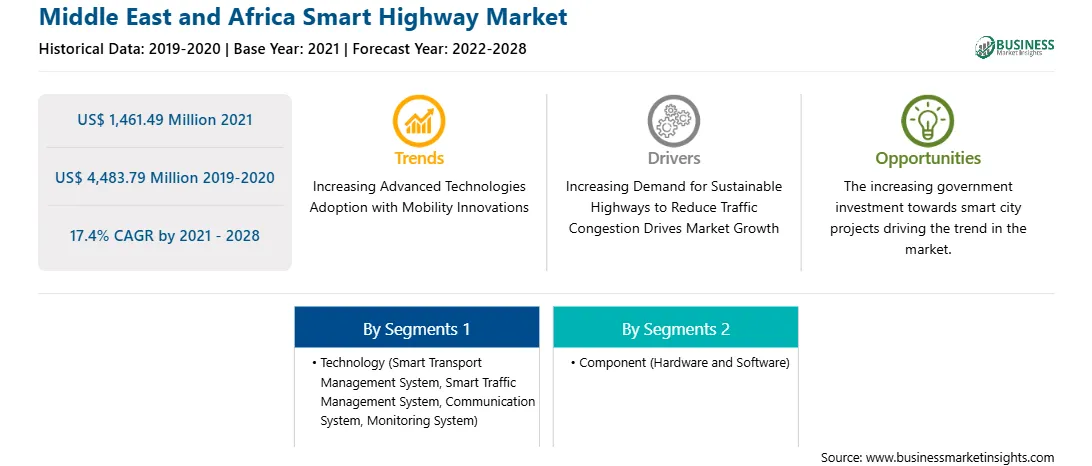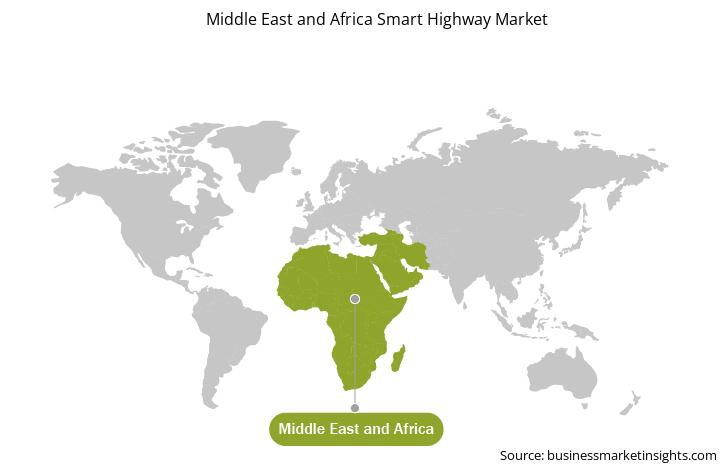Middle East and Africa Smart Highway Market
No. of Pages: 126 | Report Code: TIPRE00026828 | Category: Technology, Media and Telecommunications
No. of Pages: 126 | Report Code: TIPRE00026828 | Category: Technology, Media and Telecommunications
Market Introduction
Intelligent Transport Systems (ITS) in the Middle East & Africa is recording a rapid rise, improving the mobility of people and goods, increasing safety, reducing traffic congestion and managing incidents effectively. Benefits offered by ITS in a smart highway including real-time traffic updates to passengers and drivers is propelling the smart highway market in Middle East & Africa. The rising urbanization and increasing number of motor vehicles on road in this region have accelerated the demand for a smart transportation system. Technological advancements, such as visual signage systems, roadway taxation and electronic tolls systems, self-driving vehicles, and electric vehicles, are also propelling the demand for smart highways. To attract investments and branch out from oil, the GCC countries are determined to develop large-scale infrastructures. Transportation accounts for the second-largest planned projects sector in the Middle East & Africa. According to Middle East Economic Digest (MEED), the UAE is the second biggest transport projects market in this region, with about US$ 106 bn worth of projects planned. In 2019, Kapsch TrafficCom demonstrated its expertise in terms of highway and urban mobility management capabilities by showcasing integrated mobility solutions in realistic scenarios at Gulf Traffic in Dubai.
Middle East & Africa comprises of South Africa, the UAE, Saudi Arabia, and other countries. In this region, South Africa recorded the highest number of COVID-19 cases and is followed by Saudi Arabia and the UAE. The Middle East & Africa region has a smaller number of companies operating or offering market-specific solutions. Further, according to the Institute of Chartered Accountants in England and Wales (ICAEW), the Middle East economy has witnessed a sharp slowdown in the year 2020. The COVID-19 outbreak has negatively impacted the construction businesses of roads and highways in the region due to the supply chain disruption and the transportation sector was also affected due to the non-movement of vehicles. In 2020, thus the revenue collected from highway systems decreased, resulting in a negative impact on the smart highway market in the region. However, in 2021, with the uplifting of lockdown restrictions and vaccination processes, the road and highway construction and developments has started again, helps in creating a positive scenario for the smart highway market growth in region. Furthermore, the infrastructural readiness of several stable economies in Middle East, such as UAE, Saudi Arabia, Qatar, and Bahrain, creates ample opportunities for the governments to implement intelligent transportation systems for enabling smart highways in the region.
Market Overview and Dynamics
The smart highway market in Middle East & Africa is expected to grow US$ 1,461.49 million in 2021 to US$ 4,483.79 million by 2028; it is estimated to grow at a CAGR of 17.4% from 2021 to 2028. Insufficient road space and the lack of road sense and discipline are the key factors responsible for traffic congestions. Thus, highway authorities are focusing on implementing advanced traffic management solutions to overcome traffic problems in cities. Intelligent transportation systems, vehicle infrastructure, structural health monitoring, solar road panels, and wireless vehicle charging are crucial components of a smart highway. The integration of traffic control centers, access control, and route guidance systems offers a range of benefits within a smart transportation management system. Furthermore, assimilating AI and big data with physical infrastructures, such as sensors and solar panels, has bolstered the demand for smart roads across the world. Edge computing enables low latency that powers the smart road infrastructure, including adaptive traffic lights and integrated roadways. Traffic lights can automatically adjust their timing based on sensor data, enhancing the flow of traffic and changing signals to help protect drivers. The AAEON Atlas, supported by Intel Vision Products, is an edge computing node that consolidates data from smart lighting, environmental monitoring, and video sensors to shape future smart cities. The rising deployments of smart streetlights, smart traffic lights, smart parking, and/or e-tolling stations has augmented processing capabilities needed to monitor traffic congestion. While smart roads may still be in their infancy, significant initiatives are currently being introduced in the region.
Key Market Segments
In terms of technology, the smart transport management system segment accounted for the largest share of the Middle East & Africa smart highway market in 2020. In term of component, hardware segment held a larger market share of the smart highway market in 2020.
Major Sources and Companies Listed
A few major primary and secondary sources referred to for preparing this report on the smart highway market in Middle East & Africa are company websites, annual reports, financial reports, national government documents, and statistical database, among others. Major companies listed in the report are Cisco Systems, Inc.; Huawei Technologies Co., Ltd.; Kapsch TrafficCom AG; Nokia Coropration; Siemens AG; Conduent, Inc.; Toshiba Corporation; Nippon Koei, Co., Ltd.; Telegra; and IBI Group among others.
Reasons to buy report
Middle East & Africa Smart Highway Market Segmentation
Middle East & Africa Smart Highway Market – By Technology
Middle East & Africa Smart Highway Market – By
Component
Middle East & Africa Smart Highway Market – By
Country
Middle East & Africa Smart Highway Market – Companies Mentioned
Strategic insights for the Middle East and Africa Smart Highway provides data-driven analysis of the industry landscape, including current trends, key players, and regional nuances. These insights offer actionable recommendations, enabling readers to differentiate themselves from competitors by identifying untapped segments or developing unique value propositions. Leveraging data analytics, these insights help industry players anticipate the market shifts, whether investors, manufacturers, or other stakeholders. A future-oriented perspective is essential, helping stakeholders anticipate market shifts and position themselves for long-term success in this dynamic region. Ultimately, effective strategic insights empower readers to make informed decisions that drive profitability and achieve their business objectives within the market.

| Report Attribute | Details |
|---|---|
| Market size in 2021 | US$ 1,461.49 Million |
| Market Size by 2028 | US$ 4,483.79 Million |
| Global CAGR (2021 - 2028) | 17.4% |
| Historical Data | 2019-2020 |
| Forecast period | 2022-2028 |
| Segments Covered |
By Technology
|
| Regions and Countries Covered | Middle East and Africa
|
| Market leaders and key company profiles |
The geographic scope of the Middle East and Africa Smart Highway refers to the specific areas in which a business operates and competes. Understanding local distinctions, such as diverse consumer preferences (e.g., demand for specific plug types or battery backup durations), varying economic conditions, and regulatory environments, is crucial for tailoring strategies to specific markets. Businesses can expand their reach by identifying underserved areas or adapting their offerings to meet local demands. A clear market focus allows for more effective resource allocation, targeted marketing campaigns, and better positioning against local competitors, ultimately driving growth in those targeted areas.

The Middle East and Africa Smart Highway Market is valued at US$ 1,461.49 Million in 2021, it is projected to reach US$ 4,483.79 Million by 2028.
As per our report Middle East and Africa Smart Highway Market, the market size is valued at US$ 1,461.49 Million in 2021, projecting it to reach US$ 4,483.79 Million by 2028. This translates to a CAGR of approximately 17.4% during the forecast period.
The Middle East and Africa Smart Highway Market report typically cover these key segments-
The historic period, base year, and forecast period can vary slightly depending on the specific market research report. However, for the Middle East and Africa Smart Highway Market report:
The Middle East and Africa Smart Highway Market is populated by several key players, each contributing to its growth and innovation. Some of the major players include:
The Middle East and Africa Smart Highway Market report is valuable for diverse stakeholders, including:
Essentially, anyone involved in or considering involvement in the Middle East and Africa Smart Highway Market value chain can benefit from the information contained in a comprehensive market report.